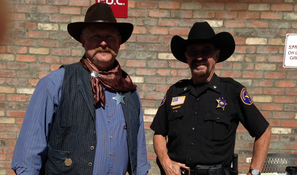This got me to thinking, as it often does, of westerns. Westerns are considered by many, including myself, as something like “America’s Genre.” The western is the quintessential American story, and it really represents to me an embodiment of all the best that our country has to offer.
But wait, many will say, isn’t the western simply a genre rife with the romanticization of White oppression and the colonization of native peoples, essentially a genre of white hegemony? Well, yes, and also no.
The Western, firstly, is many things. As Richard Slotkin has argued in his trilogy of the genre, the western has changed and morphed to suit and reflect the times in which it was made. The westerns of the 1950s were very clear-cut, and reflected the certainty of their age, while the westerns of the late 1960s and 1970s demonstrated a much more nuanced treatment of the western hero, and indeed offered a new protagonist, the “anti-hero,” most notably of the spaghetti westerns starring Clint Eastwood. Richard Etulain calls these “gray westerns” because the boundary between good guy and bad guy is much more difficult to ascertain. It was in the ‘70s that we got such notables as “Little Big Man” and later, in the 80s, “Dances With Wolves.”
But back to same sex marriage and gender roles in the western. The Western has long been a bastion of conservative values in some respects, but if we look to the literature and the history of the late 19th century, a couple of things stand out. First and foremost, the West of real life was a good bit more diverse than the Hollywood West that emulated it. Some figures put white cowboys in the minority, especially in the desert Southwest, where much of the cowboy terminology owes a great debt to the Spanish and Mexican vaqueros. Secondly, the western, as a genre, is capable of housing a multiplicity of viewpoints while still remaining a clearly identifiable western (staying true to popular genre markers), and so the tales that the western tells are not only chronicles of conquest and power, but of understanding and coexistence, and sometimes even forgiveness.
Bret Harte was an early “local color” writer whose work preceded (and some may say enabled) the success of Mark Twain. One of his notable short stories is “Tennessee’s Partner,” which is based on a real-life pair of men in California. In the short story, Tennesee runs off with his partner’s wife, only to return without her. In an unexpected twist, the partner forgives and accepts him back. In real life, the same thing happened, but the two men, Chaffee and Chamberlain, continue to live together for 54 years. While they were not exactly “out” by modern standards, the local community seems to have considered them a couple, and accepted them as such. People who had no particular acceptance for homosexuality accepted these two men.
Which brings me to my point. The frontier west was a vast space with relatively small population densities, and although it was rough and tumble, people also had to work together, and the openness of the frontier created social spaces for coexistence that did not exist elsewhere. Women, for instance, had voting rights in Wyoming from 1869, and most of the states west of the Mississippi granted women the right to vote prior to the 19th Amendment in 1920. People might not like a certain ethnicity, or gender or religion, but in the old west they couldn’t remain ensconced in insular Facebook chat rooms of like-mindedness; they had to exercise tolerance and a certain amount of acceptance, even among people with whom they disagreed. Some western stories, like “Tennessee’s Partner,” demonstrate this point. You can see this story, and others, in the collection below.
I do not for a moment suggest that the west of history or literature is really a misunderstood land of progressive thinkers masquerading as rough and ready gunfighters, but do think that it’s a good example of how people can live and even thrive together in spite of their differences, and how a good western can often show us how to do it.

 RSS Feed
RSS Feed
